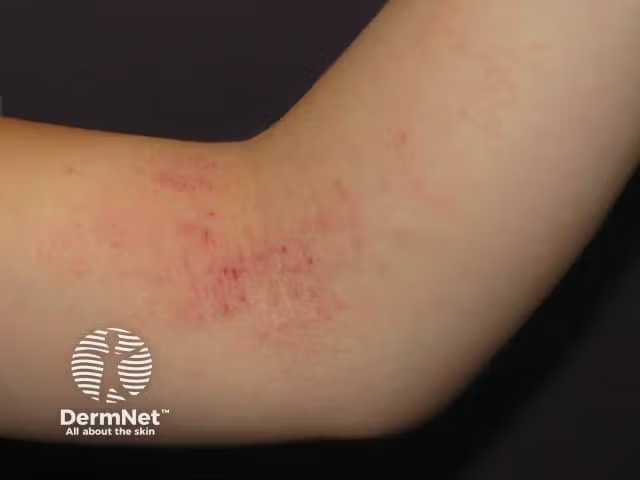- Case-Based Roundtable
- General Dermatology
- Eczema
- Chronic Hand Eczema
- Alopecia
- Aesthetics
- Vitiligo
- COVID-19
- Actinic Keratosis
- Precision Medicine and Biologics
- Rare Disease
- Wound Care
- Rosacea
- Psoriasis
- Psoriatic Arthritis
- Atopic Dermatitis
- Melasma
- NP and PA
- Skin Cancer
- Hidradenitis Suppurativa
- Drug Watch
- Pigmentary Disorders
- Acne
- Pediatric Dermatology
- Practice Management
- Prurigo Nodularis
- Buy-and-Bill
News
Article
Documented Atopic Dermatitis Journeys and Patient Perspectives in Germany
Author(s):
The study focused on the use of Internet resources, number of medical consultations, and factors influencing treatment outcomes.
A study conducted by researchers in Germany and Sweden was recently published in the Journal of the European Academy of Dermatology and Venereology to explore the patient journey of patients with atopic dermatitis (AD) in Germany. The main goal of this research was toprovide clinical insights into the challenges and experiences faced by these patients, highlighting areas for potential improvement in clinical practice.Between June 2021 and February 2022, researchers conducted a snapshot study involving participants (n = 276) from private dermatology clinics, a university hospital, and online communities. Data was collected using a questionnaire filled out by the participants themselves.1
The Patient Journey and Health Care Utilization
Investigators noted that patients with AD often engage with multiple healthcare providers throughout their journey. The study revealed that a significant number of patients initially consult a general practitioner (42.4%) or a dermatologist (57.6%) for their diagnosis. The median number of healthcare professionals consulted by patients was 5, with those diagnosed with severe AD seeing a median of 6 physicians.
Navigating Information Online
The study highlighted that 76.4% of patients with AD use the internet as a primary resource for disease-related information, primarily through Google searches. However, 63% of these users report dissatisfaction with the quality of the information found online. This reliance on potentially inaccurate or misleading online resources suggests a critical role for dermatologists in providing reliable and comprehensive information. “This study provides new insights into the patient journey of individuals with AD in Germany. It shows that patients frequently consult multiple doctors and often use the Internet for information, though they often find the quality of this information inadequate. A significant portion of patients change doctors due to dissatisfaction with treatment outcomes,” researchers wrote.
Treatment Modalities and Patient Satisfaction
Researchers aimed to gain patients’ insighton the variety of treatments utilized, including topical therapies, systemic medications, and biologics. Notably, 9.1% of participants were undergoing biologic therapy, reflecting a trend towards advanced treatment options. Despite these options, patient dissatisfaction remains an issue, as evidenced by the high number of patients changing healthcare providers in search of better outcomes. This dissatisfaction suggests a need for improved patient-doctor communication regarding treatment expectations and potential outcomes.
“About half of those treated by dermatologists stated that they were satisfied with their treatment; however, those who are severely affected are less satisfied. Gaps in care caused by dissatisfaction could be closed by new therapy options2,” investigators noted. “Hurdles for the therapy arise, for example, due to high therapy costs, low reimbursements and fear of regress claims.”3
Addressing Quality of Life
The Dermatology Life Quality Index (DLQI) and the Patient-Oriented Eczema Measure (POEM) wasutilizedto assess the impact of AD on patients' quality of life. With a mean DLQI score of 10, indicating a moderate impact, the data reveal that quality of life is significantly affected, particularly in severe cases.
Clinical Considerations
The findings from this study suggest several areas for clinical improvement. Firstly, there is a patientexpressedneed for better coordination of care among healthcare providers to reduce the burden on patients and improve continuity of care. Secondly, the dissatisfaction with online information and treatment outcomes points to an opportunity for dermatologists to play a more active role in patient education. "The study underlines the widespread utilization of medical treatment and the proactive health care-seeking behavior during a long patient journey. Dissatisfaction with treatment outcomes, alternative medicine and the quality of the Internet sources emphasize the potential for improving the comprehensive disease management to improve care outcomes,” investigators concluded.
References
- Tizek L, Tizek L, Schneider S, et al. Navigating through the healthcare system with atopic dermatitis: Analysing patient journeys in Germany. J Eur Acad Dermatol Venereol. Published online August 1, 2024. doi:10.1111/jdv.20268
- Nakahara T, Fujita H, Arima K, Taguchi Y, Motoyama S, Furue M. Treatment satisfaction in atopic dermatitis relates to patient-reported severity: A cross-sectional study. Allergy. 2019;74(6):1179-1181. doi:10.1111/all.13712
- Weiss D, Nordhorn I, Tizek L, et al. Prescription behaviour and barriers to prescription of biologicals for treatment of chronic inflammatory skin diseases in dermatological practice in two German Federal States. Acta Derm Venereol. 2021;101(9):adv00560.







